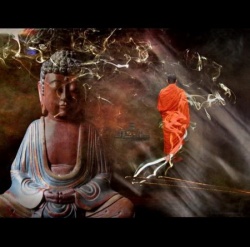The story of Suddhipanthaka
Suddhipanthaka was in the group of people that represents foolishness and dull capacity. His foolishness and dull capacity were the workings of the law of cause and effect. He was also in the group that was diligent in eliminating karmic obstacles.
He was the slowest of the Buddha’s students and had the poorest memory. When he was taught a four-line verse, he could not memorize the lines even after several days of trying to learn them. When he chanted the first line, he forgot the next lines. When he was taught the second line, he forgot the first line.
His elder brother, also a monastic, told him that he was too slow to learn from the Buddha and that he should go home. Suddhipanthaka burst into tears. The Buddha saw this and asked Suddhipanthaka why he was crying. He told the Buddha that his brother wanted him to go home.
The Buddha told him to stay and gave him a broom. He then taught Suddhipanthaka to concentrate on the broom and sweep the floor every day. As he swept, Suddhipanthaka was to repeat just two words, “sweep” and “clean.”
Before long, Suddhipanthaka attained enlightenment and arhatship. The other monastics wondered how he had accomplished this. The Buddha said that Suddhipanthaka had been a highly accomplished Dharma master in the previous lifetime. But he always held back when he gave lectures because he was afraid that others would surpass him in their achievement if he taught everything he knew. His slowness in this lifetime was a karmic result of teaching grudgingly.
The Buddha often taught in the sutras that being stingy with money will bring the karmic result of poverty and teaching grudgingly will bring the karmic result of being dull. Everything is governed by the law of cause and effect. Because he had perfect wisdom and extraordinary abilities, he knew the root cause of Suddhipanthaka’s slowness and was able to help Suddhipanthaka succeed in his practice. Ordinary people do not have these abilities and would have given up on him.
Some people may feel that because they have a poor capacity and memory they cannot learn Buddhism. Suddhipanthaka set an example for these people. How do our capacity and memory compare with those of Suddhipanthaka? Nobody’s capacity and memory are as poor as those of Suddhipanthaka. If he succeeded, why can’t we? Suddhipanthaka’s achievement is a great encouragement to people with a poor capacity.
Suddhipanthaka (Chn: 周利槃陀伽) was a disciple of the Buddha. He was known for being the most dim-witted of the Buddha's disciples, unable to understand the Buddha's teachings, and almost completely forgetting everything the Buddha said.
According to legend, one day the Buddha assigned him to sweep the ground. After a long time, Suddhipanthaka said "The ground is clean, but is my mind-ground clean?" Thereupon he attained enlightenment.

